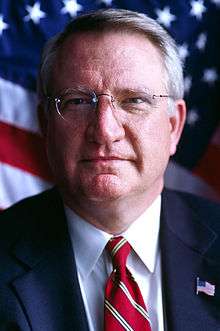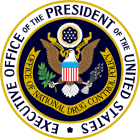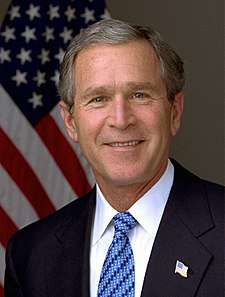John P. Walters
| John Walters | |
|---|---|
 | |
| Director of the Office of National Drug Control Policy | |
|
In office December 7, 2001 – January 20, 2009 | |
| President | George W. Bush |
| Preceded by | Barry McCaffrey |
| Succeeded by | Gil Kerlikowske |
|
In office January 20, 1993 – July 19, 1993 Acting | |
| President | Bill Clinton |
| Preceded by | Bob Martinez |
| Succeeded by | Lee Brown |
| Personal details | |
| Born | February 8, 1952 |
| Political party | Republican |
| Education |
Michigan State University (BA) University of Toronto (MA) |
John P. Walters (born February 8, 1952) is a former Director of the White House Office of National Drug Control Policy (ONDCP). He held that position from December 7, 2001 to January 20, 2009. As the U.S. "Drug Czar", Walters coordinated all aspects of federal anti-drug policies and spending.
In January 2009, Walters became the executive vice president of the Hudson Institute.[1]
Background
From 1989 to 1991, Walters was chief of staff for William Bennett and was Deputy Director for Supply Reduction from 1991 until leaving the office in 1993.
During the Reagan Administration, he served as Assistant to the Secretary at the U.S. Department of Education. He was also the Secretary's representative to the National Drug Policy Board and the Domestic Policy Council's Health Policy Working Group.

Walters served as Acting Assistant Director and Program Officer in the Division of Education Programs at the National Endowment for the Humanities from 1982 to 1985. He has previously taught political science at Michigan State University's James Madison College and at Boston College. From 1996 until 2001 he served as president of the Philanthropy Roundtable.[2]
He holds a BA from Michigan State University's James Madison College and a MA from the University of Toronto.[3] His original nomination hearing was scheduled to be held on September 11 and had to be rescheduled due to the terrorist attacks.
Policy views
Walters is opposed to the decriminalization and legalization of narcotics. Speaking of marijuana legalization in Colorado, he said, "My argument is look to Colorado: it’s getting worse. That’s exactly what they said they were going to do. Tax it; regulate it; we’re going to keep it away from kids; higher rate. I visited people shortly after the legalization in Denver. I was struck by a woman who said, 'I’m terrified for my children. We now are told our children cannot bring food or beverages to school.' Anything they consume in the school must be made under school supervision because, of course, you have brownies, fruit juices, candies, other kinds of things that are infused with cannabis or THC and can be used to poison these children."[1]
Walters is a supporter of drug treatment in place of incarceration to help drug users. In an interview, he said, "When I was in office, the criminal-justice system was the single largest category of institutions referring people to treatment using drug courts and diversion programs. Don’t send them to prison. Let’s get them into treatment because that’s what’s really causing their lives to be so self-destructive to themselves and to others. And it was that law and it was that effort."[1]
References
- 1 2 3 "JOHN WALTERS TRANSCRIPT". Conversations with Bill Kristol. The Foundation for Constitutional Government. 24 April 2017. Retrieved 6 June 2018.
- ↑ Office of National Drug Control Policy, Director John P. Walters, The White House
- ↑ John P. Walters, AllGov
External links
- Office of National Drug Control Policy
- University of Michigan, Survey Research Center Monitoring the Future, 2004
- Appearances on C-SPAN
- 6 September 1990 rare video of "National Public Radio's Morning Edition" at 01:40:06 of John P. Walters and opposing views by Arnold Trebach of the Drug Policy Foundation about the "War on Drugs."
- Information on the New Citizenship Project
| Political offices | ||
|---|---|---|
| Preceded by Bob Martinez |
Director of the Office of National Drug Control Policy Acting 1993 |
Succeeded by Lee Brown |
| Preceded by Ed Jurith Acting |
Director of the Office of National Drug Control Policy 2001–2009 |
Succeeded by Ed Jurith Acting |

